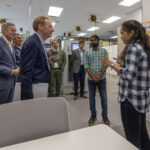A regional transportation project that UWM researchers helped launch that connects job seekers in Milwaukee to employers in the suburbs has won additional funding to keep the service running for two more years.
MobiliSE, a regional transportation group, won a $4.2 million Workforce Innovation Grant from the state to expand FlexRide Milwaukee, an on-demand rideshare service that connects workers in several Milwaukee neighborhoods to jobs in Menomonee Falls and Butler that are beyond the reach of bus lines.
The service began in February through funding from a $1 million grant from the National Science Foundationto the Southeastern Wisconsin Regional Planning Commission and UWM urban planning researchers in the School of Architecture and Urban Planning. The pilot project is off to a successful start, having attracted nearly 500 eligible participants and providing more than 100 rides per week by the end of June.
In Milwaukee, FlexRide currently serves segregated city neighborhoods and connects residents with employment hubs in the two Waukesha County communities.
The new $4.2 million grant will fund the expansion of FlexRide Milwaukee to other parts of the region starting in 2023. According to MobiliSE, the grant places a focus on working parents by positioning high-quality child care centers along Milwaukee County Transit System bus routes in Milwaukee as “mobility hubs.”The hope is that the expanded service especially aids working parents struggling with the rising costs of child care and transportation.
“UWM played a key role in helping to pilot FlexRide Milwaukee. The fact that the effort has attracted nearly 500 eligible participants and provides more than 100 rides per week shows that this type of microtransit service can be successful,” said Robert Schneider, one of the project’s lead researchers at the university.
“This important work has also helped to bring together workforce organizations, employers and local government leaders,” said Schneider, professor and chair of the urban planning department. “UWM helped lay the foundation for this service and the spinoff grant.”
Schneider said UWM will continue to be involved at least through the rest of the year in analyzing the project and its impact in a report to the National Science Foundation.






